Confessions of a Juror: How Mandatory Jury Duty Impacts Americans
 By Andrei Zakhareuski, BarPrepHero, Founder/CEO
By Andrei Zakhareuski, BarPrepHero, Founder/CEOMore help for you

- How Do Americans Feel?
- Lying to Get Out Of it
- Personal Bias and Decision-Making
- What Happens After Serving?
- An Imperfect System
Americans have been serving on juries since the 17th century when Pilgrims introduced a version of the existing system. Jury duty remains mandated, but defendants are no longer able to choose which of their peers will determine their legal fate.
Serving as a juror is called a “duty” for a reason: When summoned to serve, Americans are required to appear. Although fewer than 5% of people who are summoned end up serving, those who make the cut have a hard time wiggling their way out -- although it doesn’t stop some from trying!
To better understand how jury duty impacts Americans, we surveyed 1,184 people who had been summoned or served. Continue reading to learn how people feel about jury duty, whether party lines affect biases and perceptions, and how the stress of being on a jury impacts jurors after the trial is over.
How Do Americans Feel?
One of the best ways to engage a populace in governmental affairs is to make these engagements, such as voting and jury duty, mandatory. According to our study, 60.2% of Americans believe jury duty should be mandatory for American citizens. Of those who said it shouldn’t, Independents (44.9%) most disliked the idea of compulsory jury duty.
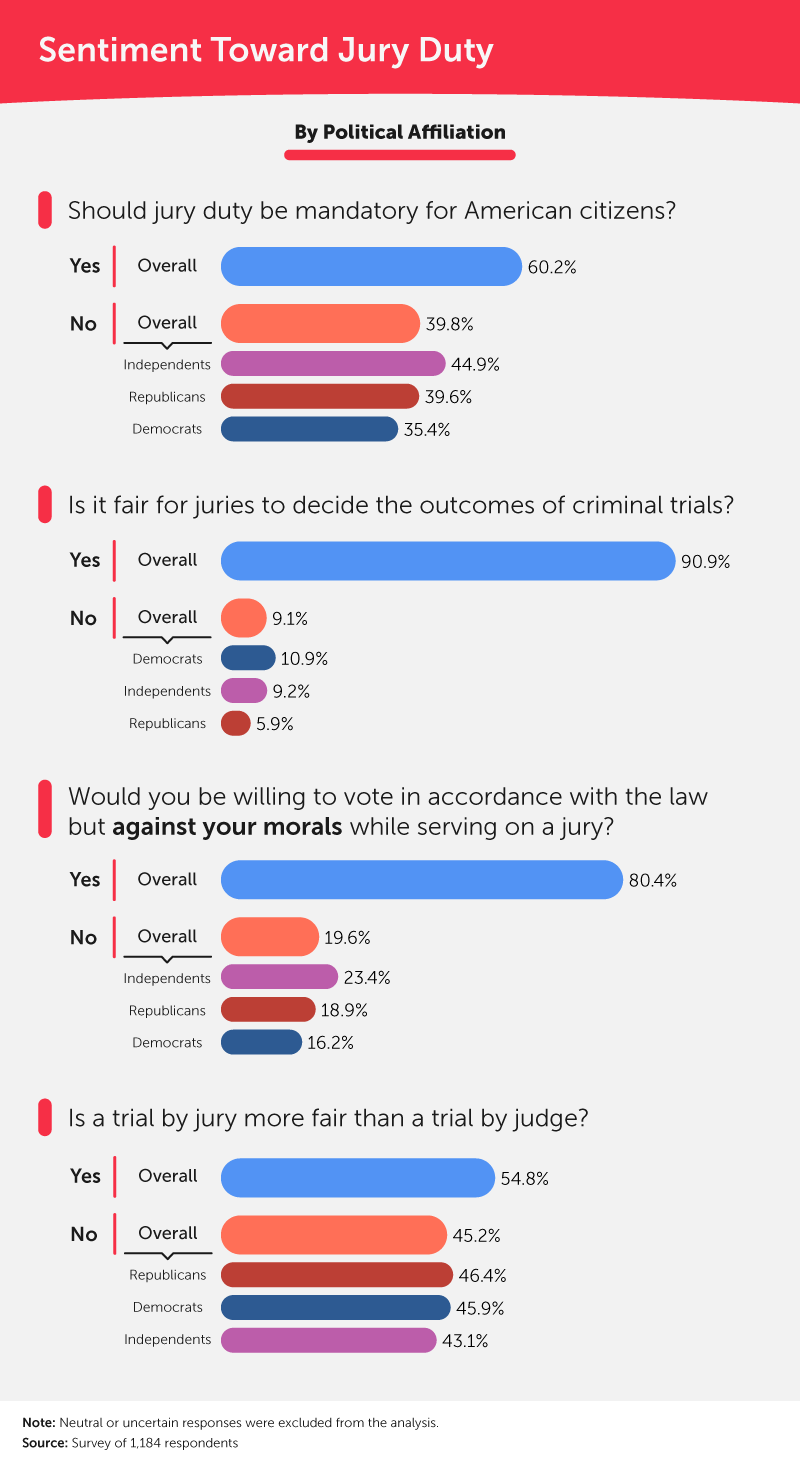
In recent years, activists have demanded more from the justice system: They want fair jury pools, especially when the fate of a person of color stands in the hands of a 12-member jury. However, participants overwhelmingly felt the jury system is fair in deciding the outcomes of criminal trials. Less than 11% of Democrats, Independents, and Republicans believed otherwise. When it came to comparing trial by jury to trial by judge, the results were nearly evenly split, with 54.8% voting in favor of a trial by jury.
Before being selected to serve, jurors must undergo a vetting process to determine if they are fit to be on the jury. The majority of the people in our study seem to be law-abiding citizens who deserve the honor. Over 80% of those surveyed would even go against their moral beliefs to vote in accordance with the law -- no moral quandaries here.
Lying to Get Out of it
Lying is … bad. It’s especially discouraged when the government is involved, but according to our study, nearly 10% of people lied to dodge jury duty. We found that 8.4% of those who lied did so because they felt a judge wouldn’t find their reason legitimate. However, needing sleep is not on the list of valid reasons to miss jury duty: A Florida judge slapped a 21-year-old man with 10 days in jail, a fine, and 150 hours of community service for oversleeping and missing a day of jury service.
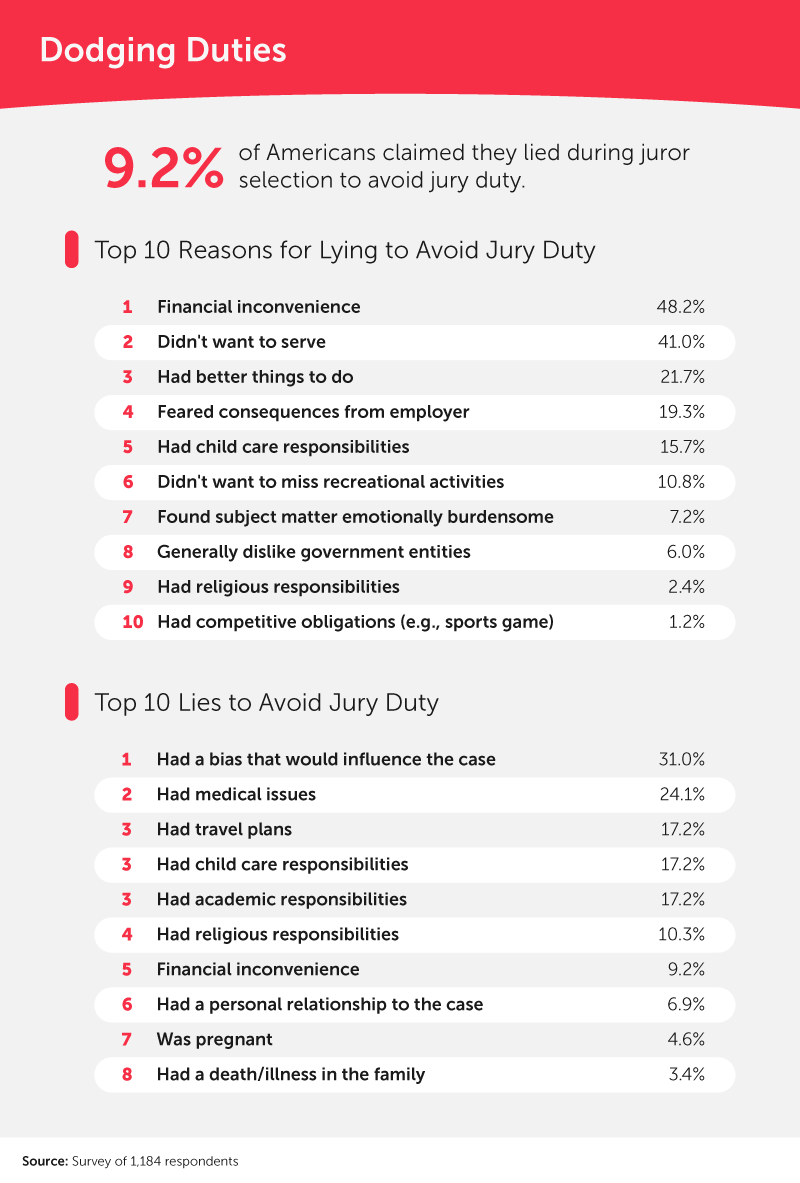
So what sort of lies are people telling? The No. 1 lie summoned citizens told: “I have a bias that would influence the case” (31%). Medical issues (24.1%) and travel plans (17.2%) followed. When we asked people why they lied, things started making sense.
Jury duty isn’t lucrative. At 48.2%, financial inconvenience was the primary reason people avoided serving. Our findings also found other valid reasons: 19.3% feared consequences from their employer, 15.7% didn’t have access to child care for the duration of the trial, and 2.4% had religious responsibilities.
Personal Bias and Decision-Making
First impressions matter. Twenty-nine percent of jurors in our study made judgments about the plaintiff and defendant based on first appearances.
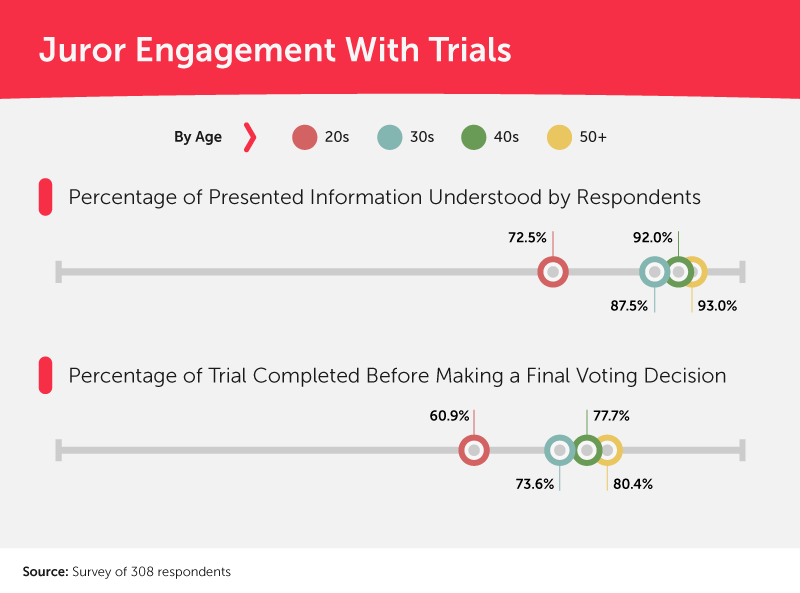
When we looked at how the age of a juror affects how they process a trial, we found that people in their 20s came to a decision after only observing 61% of the case. However, those aged 50 and older waited until they’d taken in 80% of the trial. Our findings also showed that the older a person was, the more they were likely to understand the information presented to them. People in their 20s expressed understanding less than three-quarters of the trial, while people aged 50 and older claimed that they understood 93%.
Is the jury system biased? Harper Lee’s “To Kill a Mockingbird” isn’t the only piece of literature that raises questions about the fairness of a system that relies on humans to be fair judges. Although some residents of Lee’s 1930s fictional town expressed clear bias, it’s not always easy to recognize it in real life.
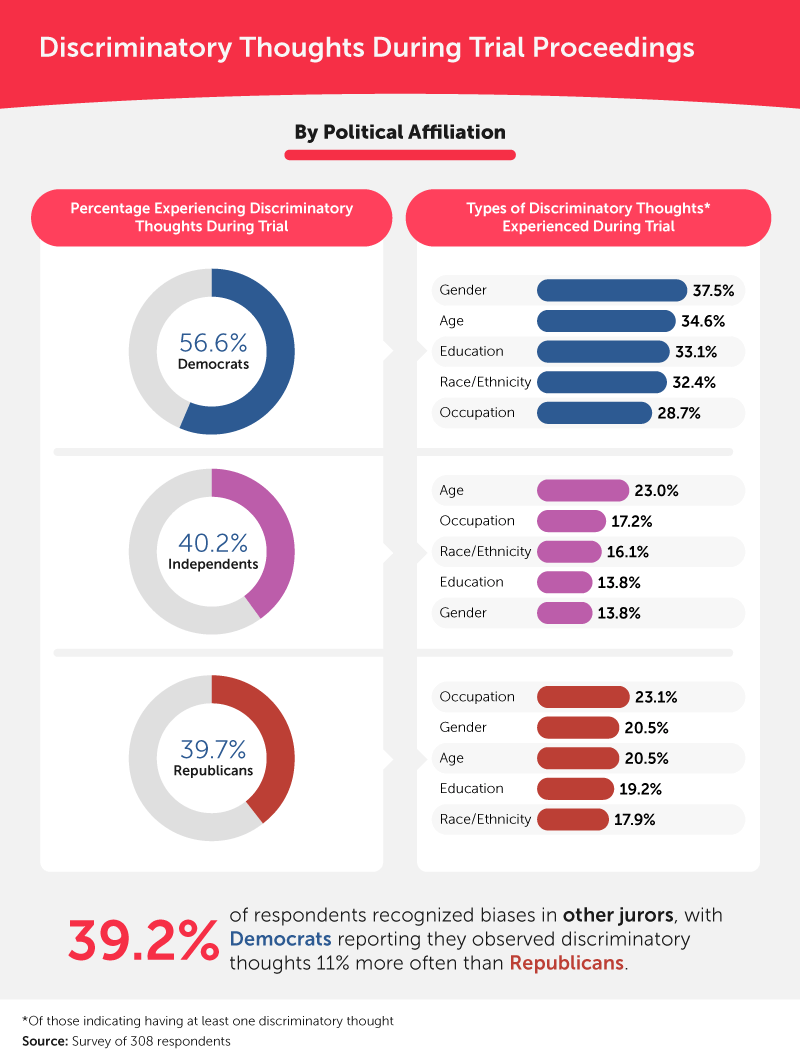
When we asked jurors whether they experienced discriminatory thoughts during the trial, 56.6% of Democrats and just 39.7% of Republicans said yes. Identifying one’s own biases is no easy task -- could it be that Democrats are more aware of bias or are willing to acknowledge it than Republicans?
What Happens After Serving?
Some trials come to a ruling quickly, but others are gruesome and drag on for months. No matter the case, jurors are expected to consume as much evidence as possible to help them come to a fair judgment -- that’s a lot of responsibility.
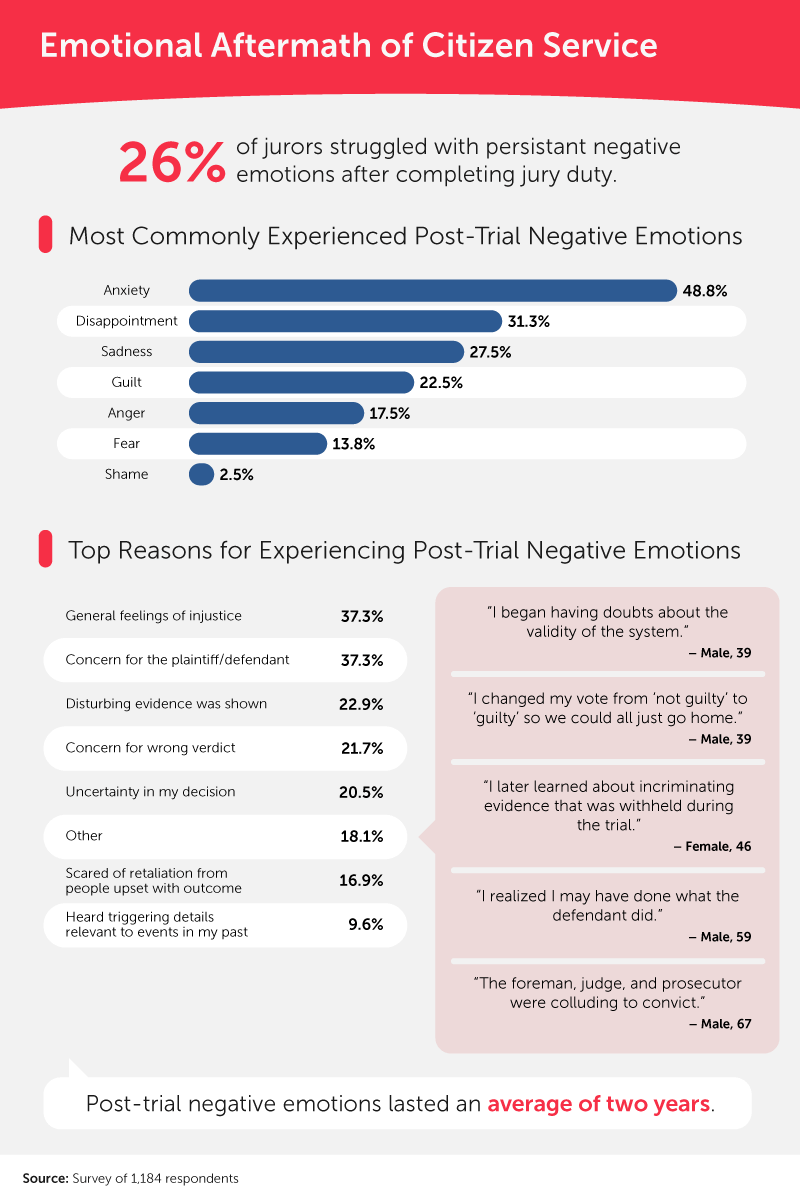
For some, the pressure of judging another’s actions becomes too heavy to bear after the fact. We found that 26% of jurors struggled with negative feelings following their duty. And those who served on a criminal trial jury were 7% more likely to experience negative emotions.
Among the negative emotions that the jurors in our study experienced, anxiety was the most common: Nearly 50% reported high levels of anxiety, while others reported feeling disappointment, sadness, guilt, anger, fear, and shame. We also found that negative emotions due to serving on a jury persisted, on average, for two years.
An Imperfect System
Our findings suggest that America’s trial by jury system isn’t perfect: We found that people lied to avoid serving when summoned, and others reported experiencing feelings of bias during the trial. However, most Americans take their civic duty seriously and would go as far as making it mandatory for others to serve.
Jury duty is just one way to contribute to American society, though. Serving our country as a bar-certified lawyer is another. With our bank of real, officially licensed questions from past exams, BarPrepHero has structured the learning process for law students looking to pass the bar. We want your review process to be conclusive, so we cover the MBE, MEE, and MPT to help you best prepare for the two-day examination.
Methodology and Limitations
We surveyed 1,184 American citizens on their opinions and thoughts toward jury duty. Respondents who had been summoned and/or served for jury duty were further questioned about their experiences and thoughts throughout the process. 51.9% of our respondents identified as female, 47.8% identified as male, and the remaining 0.3% of respondents identified as pansexual, nonbinary, or female-to-male transgender. The average age of respondents was 40 with a standard deviation of 12.7 years.
Fair Use Statement
The justice system holds you to high standards, and so do we. While we encourage you to share our content for any noncommercial use, we ask that when you share the information or images in this study, please cite the authors and link back to this page.

